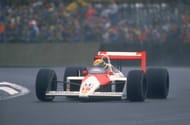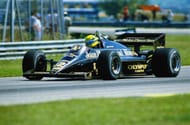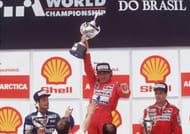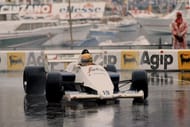In motor racing, it's said that a driver's talents show best in wet conditions because the unpredictability of grip levels required much better levels of judgement and skill to master. Ayrton Senna is, without doubt, one of, if not the, best Formula 1 drivers of all time and the Brazilian's talents were definitely showcased the most during inclement conditions. Throughout his 11 years in the pinnacle of motorsport, Senna thrilled us with his incredible speed, unrelenting never say "die" attitude, and philosophical quotes, and here are five of the original rain master's best performances in the wet:
#5 - Britain 1988

Alain Prost hand-picked Ayrton Senna as his McLaren teammate for the 1988 season, a decision that he probably regrets in hindsight. Senna claimed 35 of his 41 Grand Prix wins with the Woking outfit, aiding him to all three of his driver's world titles. '88 was the year of the MP4/4, one of the most successful and fastest F1 cars of all-time, as Prost and Senna combined to win 15 of 16 rounds that year. Going into McLaren's home race, Prost led Senna by 15 points, a large margin in the days of 9 points for a victory. Alain had struck back at his home race at Paul Ricard after back-to-back wins by Ayrton, but the British weather would help Senna out, come Sunday at Silverstone.
Gerhard Berger had surprisingly qualified on pole in his Ferrari with his teammate Michele Alboreto alongside him. Senna held his third-placed starting position on the first lap but soon passed Alboreto into second. Berger put up an excellent fight to keep the lead, but Senna couldn't be held back forever, the Austrian being passed on Lap 15 of 65. Senna wouldn't be troubled again, as he'd win by 23 seconds ahead of Nigel Mansell. Prost had an awful race, struggling with handling and being lapped early on before withdrawing, as he saw no point in continuing.
#4 - Portugal 1985

After nearly claiming a win in his debut F1 season, (more on that later) Senna produced a masterclass display to win his first Grand Prix in 1985. Ayrton had qualified on pole, his first of what would become a record 65 P1 starts. The weather was extremely wet and cold, the grip was at an absolute premium but Senna never put a wheel wrong in what was only his second race start for Lotus. Lotus are a team that have had some world class drivers and the likes of Jim Clark, Graham Hill, and Jochen Rindt would've stood and applauded had they been alive to witness this race. Senna was so rapid in the wet that Alboreto's Ferrari was the only other car which finished on the lead lap, and the Italian was over a minute behind by the time the chequered flag. Even as Formula 1 greats such as Alain Prost, Keke Rosberg, Gerhard Berger, and Riccardo Patrese spun off, Ayrton was never fazed.
By claiming pole, setting fastest lap and leading every lap, Senna had completed a Grand Slam, a perfect weekend, in other words.
To put into perspective how wet it was that day, Senna's fastest lap (the fastest of anybody) was 23 seconds slower than his position time. There's no doubt that this race never would've been run if it had taken place nowadays.
#3 - Brazil 1991

Home is where the heart is, and some drivers such as Lewis Hamilton and Nigel Mansell excel in their home Grand Prix, but that wasn't the case for Ayrton Senna. Despite already being a double world champion and piloting three championship-winning cars, Senna hadn't won at Interlagos or any other Brazilian circuit for that matter. It seemed like the immense support that he received at Sao Paulo had the opposite effect to which his fans intended, but that would all change in 1991.
Senna claimed pole position, as he so often did, and kept his advantage at the start. Nigel Mansell had fallen back in the early stages but was challenging the leader by Lap 20 of 71. Senna was helped by a poor pit-stop by Red 5 which could've easily sent Mansell out in the lead. Bad luck would again strike Mansell, as he suffered a puncture on Lap 50 thanks to striking some debris. Nigel would later retire with gearbox issues, but Senna had troubles of his own, having to stay in sixth gear for a large portion of the race. Because of the low-speed nature of some corners, Senna nearly stalled his McLaren on several occasions, but the Brazilian masterfully crossed the line ahead of Riccardo Patrese to win his first home race. The conditions had worsened in the closing laps, but the rain could've ironically helped Senna, as the effect of being in the wrong gear would've lessened. Senna was so exhausted that he couldn't drive himself to the podium and could barely lift the winner's trophy after he was taken there.
#2 - Monaco 1984

When it comes to Formula 1's great champions, there are certain drives that stand out from the rest as being true masterpieces. Ayrton Senna has at least two, with this being one of them. Senna had turned down offers from Williams and McLaren to join Toleman for his rookie year, as he wanted more control over his career. The Toleman was not a good car, in fact, it was a backmarker car, but that didn't stop Senna from pulling off one of the most surprising results ever. Like Portugal a year later, this race wouldn't have been run had it taken place in recent years, being extremely wet from the outset and getting progressively worse throughout the race.
Senna had qualified in 13th for what was only the sixth Grand Prix of his F1 career but sliced his way through the field rapidly during the race. After just fifteen laps, Senna had caught Keke Rosberg and soon passed him for fifth place. The Ferraris would soon suffer a similar fate, as would Niki Lauda, the man who would go on to win the championship that year. To put this in perspective, this is like Alexander Albon starting in the mid-pack and working his way up to second place ahead of Sebastian Vettel, Charles Leclerc, and Valtteri Bottas behind only Lewis Hamilton, this level of performance is rarely seen in sport. Alain Prost was the only man who stood in Senna's way of the lead, but a thirty-second advantage had been reduced to 7 seconds by Lap 31.
The rain had become so intense by this point that Prost was demanding the race be stopped and he got his wish, the red flag being shown less than halfway through the scheduled distance. Senna crossed the line ahead of Prost, but because of the way the timings worked, he finished second, a marvelous achievement that could've been the first victory had it not been for a corrupt FIA.
#1 - Europe 1993

The only ever F1 Grand Prix to take place at Donnington Park was the European GP in 1993. McLaren weren't the force they once were in '93, as Williams' more advanced electronic aids had made the FW14B almost invincible. Senna had qualified a decent fourth, but was muscled out by Michael Schumacher at the start and fell to fifth. The first lap at Donnington is often referred to as "The Lap of the Gods" as Senna pulled off four overtakes in quick succession to lead mid-way through Lap 1. Outside or inside, it didn't matter where the quartet ahead of the Brazilian placed their cars, nothing could've stopped Senna that day.
The weather that day was extremely changeable, alternating between damp and wet throughout, which required many pit-stops. Senna's greater judgement of the conditions and ability to race on tyres not suited to those conditions made a huge difference, as he made three stops less than Prost. In the end, he lapped all but second-placed Damon Hill and finished 83 seconds ahead of his nearest rival. Only 10 drivers finished what was a real race of attrition and Senna stood head and shoulders above them all.
